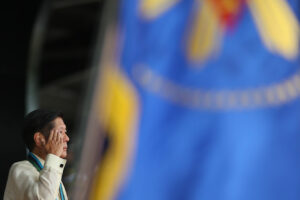By Chloe Mari A. Hufana, Reporter
ANTI-ADMINISTRATION sentiment in the Philippines rose sharply in the first quarter of 2025 with more voters expressing dissatisfaction with the governance of President Ferdinand R. Marcos, Jr. and the country’s economic direction, a Publicus Asia, Inc. survey found.
The independent, non-commissioned Pahayag First Quarter Survey (PQ1-2025) found that anti-administration sentiment soared to 45% from 30% in the previous quarter.
This is higher than the pro-administration sentiment, which saw a steep decline to 15% from 28%, its sharpest drop to date. Neutral sentiment remained steady at 39%.
“The survey findings highlight a deteriorating political and economic landscape as declining confidence in governance and worsening financial expectations shape public sentiment in early 2025,” Publicus Asia said in a statement on Monday.
The PQ1-2025 was conducted from March 15-20, using a purposive sampling of 1,500 respondents drawn from a research panel of over 200,000 registered Filipino voters maintained by the Singapore office of PureSpectrum, a US-based panel marketplace with a global presence.
Regional data revealed that pro-administration support is highest in the National Capital Region (22%), but anti-administration sentiment dominates in the Visayas (52%) and Mindanao (62%). Neutral sentiment remains strongest in North-Central Luzon (47%), according to the report.
The rising anti-administration sentiment also triggered an 8% increase in pro-opposition sentiment and a 7% rise in anti-opposition sentiment, with 46% of respondents maintaining neutrality between the two political factions.
Pro-opposition support is strongest in Mindanao (35%), while neutral sentiment is highest in North-Central Luzon (52%) and South Luzon (50%).
Hansley A. Juliano, a political science lecturer from the Ateneo de Manila University, linked this to the conflict between the Marcoses and Dutertes, which has culminated in the arrest of former President Rodrigo R. Duterte.
“While it is not unheard of for previous administrations to fall out with allies and pursue vendettas against them, this is probably the first time the political vendetta aligned with existing political and global demands, which led to Mr. Duterte’s successful apprehension and the reemergence of the anti-EJK (extrajudicial killing) allied movements’ discourse, now strengthened by the lack of persecution from an incumbent Duterte admin,” he told BusinessWorld in a Facebook messenger chat.
STATE OF THE COUNTRYMoreover, the report found that public confidence in the state of the country and its economic trajectory has also deteriorated to its weakest point since 2022.
The survey revealed that 45% of respondents perceive the state of the country as weak, up from 35% in Q4 2024, while only 28% consider it strong, slipping from 31% in the previous quarter.
Similarly, 45% of respondents believe the country is headed in the wrong direction, a significant increase from 32% last quarter, while those who think the country is on the right track dropped to 29% from 42%.
Mr. Juliano attributed the decline in the country’s economic prospects to external factors, such as the fragmentation and vulnerabilities of major economies like the United States, the European Union, and Japan.
“Any suffering in the firms in those countries, especially if they outsource operations here/their supply chains reach here are likely to impact us,” he said.
“Because of this, the fact that the Marcos Jr. admin isn’t exactly innovating beyond the neoliberal status quo helps explain the downturn and vulnerabilities being more keenly felt. We are clearly still being outpaced by Vietnam and India in exploiting this downturn.”
Concerns in the economic trajectory of the country are most pronounced among respondents in Mindanao, the youth demographic (18-29 years old), middle- and high-income families, non-working individuals, and those with a college education.
Economic pessimism has also spread to household financial prospects with 39% of respondents expecting the national economy to decline further, up from 26% in the previous quarter, while optimism fell to 32% from 48%.
Meanwhile, household financial expectations have weakened, with 48% believing their financial situation will improve, down from 60% last quarter.
Across all demographics, two in three registered voters expressed pessimistic sentiments about the country’s outlook for Q2 2025, with 30% reporting growing anxiety about the nation’s future.
